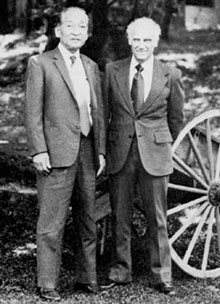 |


|
Spring 2004 | Volume 26, Number 6 | Features |
||||||
| My Enemy, My Friend Two Men Answer God’s Call in the Aftermath of War MITSUO FUCHIDA HAD A military strategist’s admiration for the courage of the Doolittle Raiders and their daring mission.
Japan’s defeat was a great loss of face to Fuchida, who had been a rising star among naval pilots. Despite the stunning devastation his 360 fighter pilots wreaked on eight battleships and their American crews in Hawaii, his dreams of becoming a great admiral quickly faded. As he stepped off the train in Tokyo one October day in 1948, Fuchida saw an American distributing pamphlets. The title, Watakushi Wa Nippon No Horyo Deshita (I Was a Prisoner of Japan), caught his eye. On his way to the trials to answer for atrocities committed against war prisoners, he could not have known that that little tract written by one of those prisoners was about to change his life forever. The tract contained Jake DeShazer’s story in his own words. And it was all there — the capture, the torture, the starvation and the amazing transformation that turned him from an enemy hater into a man of peace and Christian love. Fuchida could neither explain it nor forget it. “The peaceful motivation I had read about was exactly what I was seeking,” he wrote in his own printed testimony, From Pearl Harbor to Calvary. “Since the American had found it in the Bible, I decided to purchase one myself, despite my traditional Buddhist heritage.” In the weeks to follow, he read the Bible eagerly, and when he came to Jesus’ prayer on the cross, “Father, forgive them, for they know not what they do,” he prayed for forgiveness and committed his life to Christ. Gomenasai, he confessed. I’m sorry. Within just a month, Fuchida and DeShazer both gave their testimonies at a mass meeting in Osaka, and nearly 500 people declared their desire to become Christians. The two men eventually became close friends. DeShazer continued evangelizing and establishing churches in Japan with Free Methodist World Missions, while Fuchida joined Worldwide Christian Missionary Army of Sky Pilots and preached in the United States. When the former military commander died in 1976 at the age of 74, DeShazer attended his friend’s funeral in Kashiwara, Japan. “His new life in Christ was one of the highlights of our ministry,” says DeShazer, who in the past year welcomed Fuchida’s son and daughter into his Oregon home for a visit. “God uses a lot of things to bring us around, to awaken us and get us to him,” DeShazer points out. Strange, he acknowledges, that war could be one of those things. Back to the top Back to Home |
